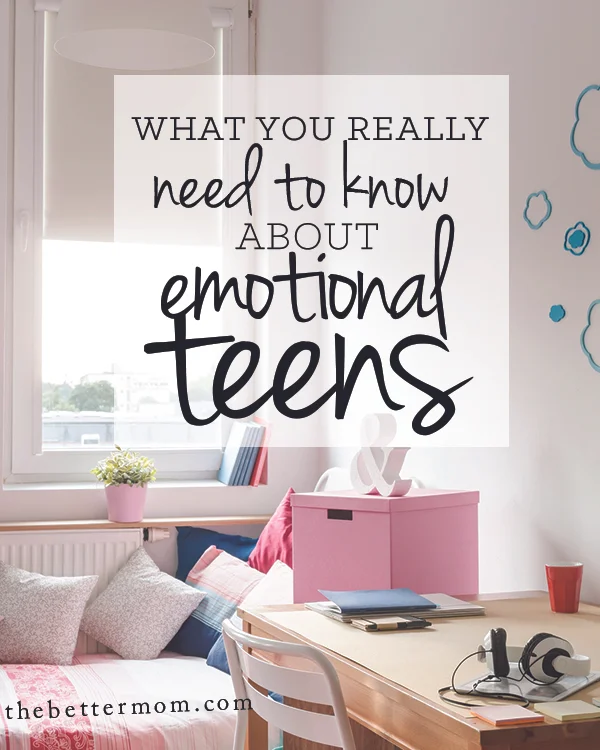What You Really Need to Know About Emotional Teens
I have three children beyond their teen years, and I currently have four teens in our home. Let’s pause right now as I ask for prayer. Do you also have a teen—an emotion-filled creature—in your house? I’ll pause and say a prayer for you too.
One thing I’ve learned with these teens is that their depths of these emotions run deep. Here’s a few things you really need to know about their emotions.
1. Teens feel everything very deeply. It may seem as if teens are just being dramatic, but the emotions are real. All emotions—good and bad—are felt toward the extreme.
Hormones in teens are a very real thing. Hormones cause emotions to swing, and it’s important to help teens understand that. I let my teens know that when I’m hormonal I feel as if everything’s wrong with the world … but it’s just the hormones. Because we talk about it, my teen daughters often tell me, “I’m ready to start my cycle, if I act crazy, tell me to chill.”
And even though it may not be as obvious or drastic, teen boys deal with emotions too. Yet while hormones do play a part, it’s more than that. Just as your teen is growing and developing during puberty, your teen’s brain is too.
With these changes a teen’s emotions centers are heightened. The big, dramatic emotions feel real, and most of the time your teen is just as overwhelmed and surprised by these emotions as you are.
2. Teens are lacking common sense. Not only are they emotional, teens are also impulsive. Your teen’s frontal cortex is still developing. Even though teens look like adults, they don’t have the same thinking skills. The developing frontal cortex is associated with decision-making, insight, judgment and inhibitory control. They really do lack common sense and aren’t able to think things through as adults can. This leads to impulsive decision making. It’s not just your teen … it’s all teens.
3. Teen brains have big needs. First, because of all the rapid growth and changes teens need SLEEP. Because of all the growth and changes, their bodies need more rest: about 9-10 hours a night. They also need good nutrition. Teens who don’t eat right become irritable and depressed. Good nutrition is needed to feed the changing brain. Teens also need physical exercise. Studies show that when kids are active it actually helps brain development.
4. Teens try to hide their anxiety. They often feel overwhelmed and insecure, even though they try to play it cool. Teens often worry that they won’t fit in. They hate being left out and they have a longing to be included. They fear rejection and sadly—too often—rejection happens. One day your child has a best friend and the next that friend has moved on to a new crowd.
A teen’s anxiety often comes because they always feel as if they’re performing. By this age, teens have developed the ability to see beyond themselves. They try to see themselves as others see them. They imagine other peoples’ thoughts and feelings. This lead into worries about how they are viewed.
Typically, anxiety lets the body know when it’s in danger. The problem comes when the anxiety is out of proportion to what’s really happening: she feels unsafe even when she’s safe. When this happens, and it’s becoming hard for a teen to manage, it’s important to talk to your pediatrician and seek outside help.
5. Teens need to know you’re on their side. Sometimes it seems as if your teen has become your enemy, but it’s important to understand their “mad” isn’t often about you—even though they may take it out on you. To your teen, you’re a safe place, and so they often let their emotions explode because they need to get something off their chest and they trust you’ll listen and help.
Even if you don’t like the anger, the best thing to do is validate their feelings. Just saying, “You’re mad or you’re frustrated” lets them know you’re tuned in and care. Try to discover the root of the emotion. It might take peeling back the layers and taking time to listen.
6. Teens need to know that God is on their side. Even though emotions feel real, we can use them as a gauge to lead us to our Guide, Jesus. When emotions become overwhelming, let teens know that they can take those emotions to God. We all—no matter what age—can share our anger, frustration, and worries with him. As Philippians 4:6 says, “Do not be anxious about anything, but in every situation, by prayer and petition, with thanksgiving, present your requests to God.” Even when parents aren’t available to offer emotional support, God will be there. He will be a foundation that your teens can lean on through life.
Learning these things about my teens’ emotions has helped me be a better parent. I’ll share more about how I’ve learned to respond to these emotions next month. I also share more in my upcoming book: Calming Angry Kids. But overall it helps to know that my teen is going through big changes, and I don’t need to take their emotions personally. Instead, I can be a steady support during this overwhelming time.
Tricia
Share this post:








